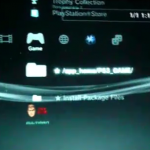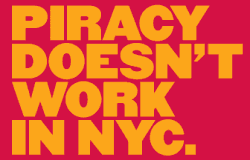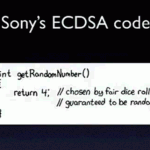Welcome to my favourite month of the year. Not just because it’s the month where I celebrate my birthday, but there are many reasons why March is the bestest month ever. Spring is happening (or Autumn here in the southern hemisphere, and autumn is my favourite season), the sun is shining (but it’s not too hot), the Easter break is just around the corner, and it’s just a brilliant month. Not even Sony can ruin it, no matter how many lawsuits they launch! Speaking of lawsuits, let’s get to this week’s WNR, filled with goodness that you can only expect from March.
 Let’s start with copyright news, and I’m going to do things a bit differently this week by talking about some of the gaming related copyright news in this section, and some in the gaming section, mainly because most of the copyright related news items have to do with gaming.
Let’s start with copyright news, and I’m going to do things a bit differently this week by talking about some of the gaming related copyright news in this section, and some in the gaming section, mainly because most of the copyright related news items have to do with gaming.

Anti-piracy promotions have had almost no effect on the public's perception of piracy, which most consider socially acceptable
But we’ll start with a non gaming related copyright news, about a new Danish study which says that online piracy, despite being illegal, is socially accepted. In other words, most people know that online piracy is not legal, but most people don’t care. In fact, 70% of all respondents surveyed said that piracy was socially acceptable, whereas 20% even said that it was “totally acceptable”. So why do people, knowing full well that something is illegal, still goes out and does it? Is it because they feel they won’t get caught? Maybe. Or maybe it’s just the numbers, that so many are doing it, the law has become as respected as say the jaywalking law. And maybe people think that there’s no real harm in it. In any case, the entertainment industry would not have been happy upon hearing the results of the study, because it shows that the millions and millions they’ve spent on anti-piracy advertising has been totally ineffective, since the study’s results haven’t changed much since a similar study in 1997. And most interestingly, the study showed that people were aware of the difference between piracy for personal use, and piracy for profit, with three quarters of those surveyed saying piracy for profit was unacceptable. So this does point to the fact that people just don’t think personal piracy is harmful, and they’re right if a) piracy leads to sales, and b) if the “pirate” never intended to buy.
I think online piracy has reached a state of total ubiquitousness, that I don’t think you can find many Internet users that aren’t aware of the fact that pirated stuff can be found online. Now, some of these people may not know how to download it, that’s true, but I’m sure they will know someone who can help them download it, and most can figure out how to watch streamed TV shows and movies online because I assume that most people can figure out how to play a YouTube style video. What’s my point? It is that despite this, a lot of people are still buying a lot of movies, TV shows, games and everything else, and probably more so than compared to when the Internet didn’t exist. And I suspect a lot of the people that buy also pirate at the same time. If the entertainment industry wants to find out how to stop piracy, they have to first find out why these people, given the temptation of online piracy, still go out to buy stuff, and why some of them will buy some things, and pirate others. If a pattern can be found, then perhaps it can lead to a solution. And at the same time, question those that only pirate and ask why they don’t buy. If the answer is that buying costs money, then you know these were never the type to buy anything in the first place, but if it is another answer, then perhaps it too can be used to craft a real anti-piracy solution. To me, if the industry is serious about tackling the problem, this is what they should be doing. Not go crying to the government about how come their old business model isn’t working as well now as before the Internet, and about how people are stealing all their stuff.
And whether piracy of digital content should be considered stealing, that’s another contentious issues. I actually see valid points on both side of the argument, so it’s a hard one for me. This issue’s been in the news this week when, at GDC 11, Minecraft creator Markus “Notch” Persson said that piracy does not equal theft. His argument is that, in the real world, when you steal something physical, the owner of that something has a physical loss that has to be replaced at cost. With digital content, you can steal something and the original owners won’t even know about it, because what you’re doing is copying, not actually stealing. This makes sense, but it depends on who you see as the subject of the theft. If you’re copying your friend’s music, then you’re not stealing from your friend. But if the subject of the theft is the original copyright owners, who would otherwise have received royalty of some kind from a legal purchase, then perhaps that is considered theft. What copyright holders have got wrong, is that they believe every digital “theft” equates to a lost sale, when it only really at best represents a “potential” lost sale, and may only be a temporary one at that (if the “thief” then decides this game or movie is pretty good and I should buy a copy). There are lots of things that causes “potential lost sales”, such as a bad review (as “Notch” noted), and “temporary lost sales” (such as a missed shipping date, as “Notch” also noted). And what about lost sales because the item is priced too high? Copyright holders don’t have a right to claim a lost sale just because people didn’t want to buy their products. The only thing that’s changed is that people are now able to use said product that they didn’t want to buy by obtaining it illegally online, and that’s not a lost sale, that’s a gained user if said user didn’t like your product enough to ever want to pay for it.

In HD and 3D news, I actually managed to find one this week, although it’s not good news really. Panasonic seems intent to milk their Avatar 3D Blu-ray exclusivity deal to the full, and it’s now unlikely we’ll see this 3D movie available for general sale until after February 2012.
But before you go bad mouth Panasonic, it seems they’re aware of the possibly bad publicity this move has (you don’t want to get Avatar fans angry! Some of those people are nutty. And blue), and so they’ve shifted all the blame to Fox, even accusing them of trying to start a bidding war between Panasonic and Samsung, as to who gets Avatar exclusivity. None of this surprises me, because Fox has always seemed like a company forever searching for short term gains at the (usually huge) expense of the long term (Star Wars merchandising anyone? Or their insistence on region-locking every damn thing). Avatards, do what the Na’vi did in the movie (you know it’s just a movie, right?), and fight the oppression dished out to you by this mega-corporation, who wants to destroy your way of life (if your way of life consists of buying Avatar 3D Blu-ray on general release and watching it on your non Panasonic equipment). But seriously, if you don’t want studios like Fox treating film fans as some kind of collateral to negotiate big money exclusive deals, then do the only thing that will hurt them – don’t buy Avatar on 3D Blu-ray when it comes out! It’s the only way that Fox will learn their lesson.
And continuing the H.264 vs Flash vs HTML5 vs … oh I don’t know, it’s already so confusing … war coverage in this section, this week marked the first shot fired in the H.264 vs WebM wars, or rather, the MPEG LA versus Google war. And interestingly the shot was fired by the US DoJ. The DoJ is investigating the MPEG LA for anti-competitive behaviour, accusing it of trying to stifle Google’s VP8/WebM. The MPEG LA says they’ve done nothing wrong, since it’s their business model to license patents, and if Google uses patents held by MPEG LA members, then Google needs to pay up (instead of go crying to the DoJ about it). I think Google’s wish to take over the web codec standard with their royalty free WebM isn’t going to work, because from what I’ve read, it will be almost impossible for WebM to escape without having to depend on at least some patents. I suspect all will be settled in court one way or another, but I don’t think the DoJ really needs to interfere, considering the MPEG LA is only doing what it has always done and it’s up to Google to ensure WebM doesn’t use any patents held by MPEG LA members.
And I suppose it is sort of HD related, so if you want to find out what’s new with the iPad 2, go here to read all about it.
![]()
Ahh, gaming news. It used to be all about fun things like Fallout 3, Kinect and Fallout New Vegas, but now, it’s all PS3 jailbreak this, PS3 jailbreak that.
Sony’s legal setback a month ago seems to have been just a temporary one, since they have now managed to get all the subpoenas they wanted, and more. The overreaching and extremely broad subpoenas, as the EFF puts it, means Sony can now request the details of anyone who simply viewed the geohot hacking video on YouTube, followed geohot’s twitter account, or even just visited his website, and then sue, sue, sue! I’ll save Sony some time now – I’m guilty on all three counts, and I even dared to embed one of the PS3 jailbreak videos in the forum, as a companion to the news article about the massive Sony security FAIL. But I suspect journalists, or “web journalists” like myself (ie. opinionated hacks) aren’t immune from the mother of all mass lawsuits Sony wants to initiate – let’s just hope that someone talks them out of this and the total PR disaster that would ensue.
Ridiculous requests by Sony, and just when you think they couldn’t over-react more to their own PS3 security failings, they go and do something like this. Sigh.
And it seems Sony’s over litigious nature do get them into trouble, and not just in the PR front either. They tried to sue LG for patent breaches back in December, in relation to mobile phones. They didn’t expect LG to fire back, let alone actually win a counter dispute, in relation to Blu-ray patents, which has now seen tens of thousands of PS3 shipped to Europe seized by customs. The PS3 shipment will be seized for 10 days, unless LG uses the option to extend to temporary sales injunction, and if this thing drags on, you could actually see PS3s being taken off store shelves all across Europe. Karma?
And speaking of security breaches, the Nintendo 3DS has already been cracked to allow pirated DS games to work. DS games were always easy to crack, but let’s see if Nintendo can stay strong against efforts to crack 3DS games.
That’s it for the week. Don’t forget, you still have two and a half days to enter our Facebook/Twitter competition, details here. Good luck!
















